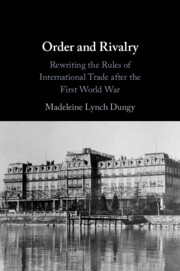‘An important and refreshing history of international trade - too long the Cinderella-subject of new histories of capitalism. This timely account reveals how conflict was more important than cooperation as Europeans learned they needed institutions and legal norms to keep markets open, generating a framework for world trade for decades to come.’
Patricia Clavin - Oxford University
‘With undisputed relevance to the current global situation, the author offers new insights into the role of the League of Nations and its significance for the development of multi-layered trade governance. The book convincingly analyzes the longstanding patterns of multilateral decision making and their use in controversial ideological contexts. It also shows how a new multilateral order is both urgent and difficult to implement - presenting crucial lessons to learn from a troubled past.’
Madeleine Herren-Oesch - University of Basel
‘In this outstanding book, Madeleine Dungy provides a penetrating, very wide-ranging and strikingly original reassessment of the global politics of international trade after the Great War. Drawing on a formidable array of public and private archival sources from across Europe and from both sides of the Atlantic, the book recovers the influence of internationalists projects for the construction of a new multilateral commercial order. The League of Nations provided the necessary political and administrative context for negotiations aimed at creating a new institutional architecture for international trade. Yet Dungy’s analysis is also alive to the complex interrelationship between commercial negotiations and the quest for European security and to the fundamental role of competing interests and contending conceptions of regional, global and imperial economic order. A superb study that adds much to our understanding of the international and economic history of the interwar period.’
Peter Jackson - University of Glasgow
‘In this deeply researched and highly original work, Madeleine Dungy has transformed our understanding of the international politics of trade in the twentieth century and the rise of global economic governance. This masterful book is essential reading for those interested in the history of the modern world economy and the crisis of globalization caused by the First World War.’
Jamie Martin - Harvard University
‘This is an important book not only because of its message but also because it shows how political and internationalization historiographies have matured. It convincingly explains the importance of the League of Nations (and perhaps, by implication, the United Nations) as a forum for progress in the world. On top of that, Dungy's biographical touchstone approach works well. She successfully shows how, under the designs and negotiations of the four bureaucrats, the always contested rules of world trade came together into a system that, in her concluding worlds, 'proved remarkably durable'.'
Thomas Zeiler
Source: H-Diplo
‘By focusing on the four selected protagonists, Lynch Dungy has chosen an innovative approach for her book … and opened up interesting material and made it available to the professional public. Many details will be of particular interest to specialists in the history of international trade and its regulation.’
André Steiner
Source: Zeitschrift für Geschichtswissenschaft
‘A sophisticated, scholarly, and highly original study of the European contribution to the making of international trade policy and regulation in the 1920s … This book is based on a wealth of archival and printed primary sources, imaginatively deployed. It deserves to take its place among the key scholarly contributions to the wider revival of the historiography of the League of Nations while also providing an illuminating study of visions of European unity and of global trade policy.’
Anthony Howe
Source: European History Quarterly



